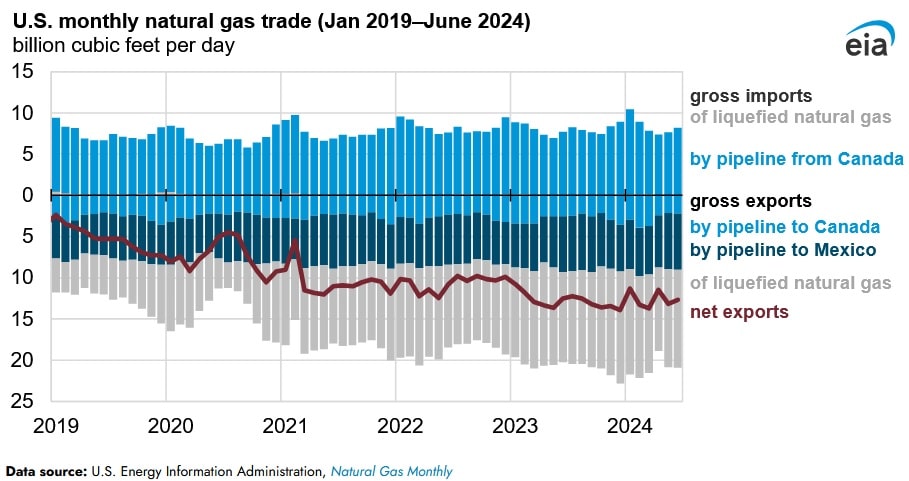Net U.S. Gas Exports Unchanged During First Half of the Year: EIA

Net U.S. natural gas exports averaged 12.6 billion cubic feet per day (Bcf/d) during the first half of 2024, up one percent compared to the first half of 2023 according to an Sept. 25 report published by the U.S. Energy Information Administration. Net exports were two percent less than in 2023.
U.S. natural gas exports since 2019 have mainly been driven by increases in liquified natural gas exports and pipeline gas exports to Mexico. The U.S. has become a net natural gas exporter since 2017. The shift to net exporter happened as natural gas production in the U.S. continues to increase, reducing pipeline imports from Canada and increasing exports, both by LNG and pipeline.
The U.S. trades LNG with over 40 countries and natural gas by pipeline with Mexico and Canada. The U.S. is a net importer of pipelined natural gas from Canada and a net exporter to Mexico. Meanwhile, the U.S. since 2016 has been a net exporter of LNG.
The rise in U.S. LNG exports can be attributed to the increase in LNG export capacity. Liquefied natural gas exports grew from a yearly average of 0.5 Bcf/d during 2016 to 11.9 Bcf/d in 2023. As it stands, the U.S. has seven export terminals operating and five terminals under construction. The agency expects two new export facilities to commence operations by the end of 2024.
Pipeline gas imports from Canada are vital to balance the U.S. gas market particularly during the winter months. Majority of the gas imported from Canada enters into the Midcontinent and Western regions of the U.S. Last year, 83 percent of the net imports from Canada went to the western U.S. During the first half of this year, U.S. imports from Canada averaged 5.4 Bcf/d, up 11 percent compared to the first half of 2023. Net U.S. pipeline gas exports to Mexico averaged 6.3 Bcf/d during the first half of 2024, up seven percent compared to the first half of 2023. Moreover, pipeline gas exports are set to increase further as new natural gas pipeline projects receive regulatory approval.
EnerKnol Pulses like this one are powered by the EnerKnol Platform—the first comprehensive database for real-time energy policy tracking. Sign up for a free trial below for access to key regulatory data and deep industry insights across the energy spectrum.
ACCESS FREE TRIAL